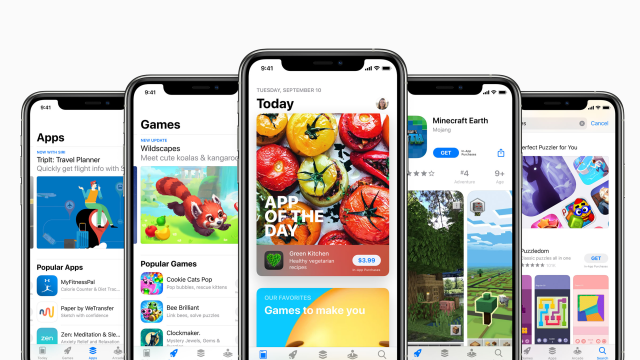Earlier today, Apple posted an update to its guidelines for the App Store including new language regarding game streaming that makes it appear as if game streaming services are technically allowed. However, in practice that doesn’t seem to be true.
Aside from the recent spat between Apple and Epic after Fortnite got booted from the App Store, companies trying to provide game streaming services on iOS/iPadOS have been blocked by Apple due to vague rules and regulations. For instance, Google’s cloud-gaming Stadia app is only used as a shell for managing your subscription, purchasing games, or setting up Stadia controller. You can’t actually play games on iOS using the Stadia app.
And back in early August, Microsoft was forced to cut short the beta trial for its xCloud game streaming service (which is now called Xbox Game Pass Ultimate), with a statement from Microsoft saying:
“Our testing period for the Project xCloud preview app for iOS has expired. Unfortunately, we do not have a path to bring our vision of cloud gaming with Xbox Game Pass Ultimate to gamers on iOS via the Apple App Store. Apple stands alone as the only general purpose platform to deny consumers from cloud gaming and game subscription services like Xbox Game Pass. And it consistently treats gaming apps differently, applying more lenient rules to non-gaming apps even when they include interactive content.”
Many were hoping that down the line, Apple would clarify or expand the App Store’s rules governing game streaming streaming. However, after checking up the updated language, that doesn’t appear to be the case.
In section 4.9 of the Apple Store Review Guidelines which covers game streaming, Apple says:
4.9 Streaming games
Streaming games are permitted so long as they adhere to all guidelines — for example, each game update must be submitted for review, developers must provide appropriate metadata for search, games must use in-app purchase to unlock features or functionality, etc. Of course, there is always the open Internet and web browser apps to reach all users outside of the App Store.
4.9.1 Each streaming game must be submitted to the App Store as an individual app so that it has an App Store product page, appears in charts and search, has user ratings and review, can be managed with ScreenTime and other parental control apps, appears on the user’s device, etc.
4.9.2 Streaming game services may offer a catalogue app on the App Store to help users sign up for the service and find the games on the App Store, provided that the app adheres to all guidelines, including offering users the option to pay for a subscription with in-app purchase and use Sign in with Apple. All the games included in the catalogue app must link to an individual App Store product page.
So while technically game streaming services are allowed, developers of game streaming apps would need to create individual listings for every game available within the service, which is not only a huge burden logistically, depending on the copyright and publishing rights for each game, developers of game streaming apps may not even be authorised to do so.
The requirement presents a massive challenge for any game streaming app, because at its core, Apple is treating game streaming services completely different than how it treats video streaming services like Netflix, Disney+, Hulu, etc, which don’t need individual App Store listings for every single show or movie. Microsoft says Apple’s guideline tweaks aren’t good enough.
“This remains a bad experience for customers,” a Microsoft spokesperson told The Verge. “Gamers want to jump directly into a game from their curated catalogue within one app just like they do with movies or songs, and not be forced to download over 100 apps to play individual games from the cloud. We’re committed to putting gamers at the centre of everything we do, and providing a great experience is core to that mission.”
The one small window of opportunity is where Apple mentions the use of the internet and web apps to reach users on iOS without going through the App Store. This would potentially allow Google to create a workaround for Stadia where, instead of relying on a dedicated app, users could simply play games via the Chrome browser app for iOS, similar to how people access Stadia on PCs using the desktop Chrome browser.
Currently, the primary method Stadia users employ to sidestep Apple’s rules is by installing Google’s Remote Desktop app, and then accessing Stadia using the Chrome browser on a connected PC. Because of the added latency this workaround introduces, it only really works if you have a strong wifi connection, which means it’s not a real solution for gaming on the go.
Unfortunately, while this does provide a potential avenue for game streaming on iPhones and iPads in the future, it’s going to take some extra time and development from Google, Microsoft, Nvidia, and others to create web portals for their services instead of simply relying on a dedicated standalone app.
But when it comes to the App Store, it’s Apple’s way or the highway, and for any game streaming services that don’t feel like following the rules, just like Epic Gaming, they’re bound to get the boot.
